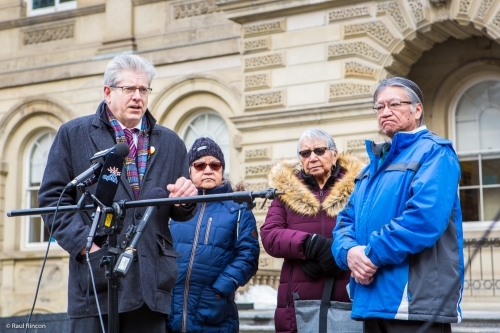The Canadian Railway Blockade Explained
Comments of Charlie Angus of Canada’s New Democratic Party
February 15, 2020

The railway blockades across the country have shaken up the political and business establishment in Canada. There are millions of opinions floating around Facebook/Twitter about the meaning of these protests. The media pundits seem absolutely shocked. Talking heads for the right-wing are denouncing these actions as mob rule, but none of them have a credible plan for defusing the situation. On the centre/left the focus has been on who is the legitimate voice of authority in the Wet’suwet’en lands. And as the Toronto Star pleaded, “There are growing calls for somebody to do something.”
My friends, we are witnessing an extraordinary moment in Canadian history.
If you spend any time in First Nation communities, you won’t be surprised at this unprecedented challenge to the status quo. It’s been brewing for a long time. And if you have the opportunity to talk with young people who are growing increasingly angry about political lip service on the environmental crisis, you’ll see why the RCMP move against the Wetsuweten blockade touched off a perfect storm.
RULE OF LAW
First off, I will say that I have real concerns about the impacts on rail traffic in Canada by the blockades. But as I sat with St. Anne’s Residential School survivors this week, they put the government’s lines on the rule of law in perspective. “People are being inconvenienced,” one of the elders said, “We First Nation people had our lives ruined, and nobody ever worried about what happened to us.”
The fact that the survivors were in court yet again, to deal with a government that suppressed thousands of pages of police evidence regarding the horrific crimes committed against the children in this brutal institution. Justice Department lawyers have gone out of their way to have the cases thrown out for a lack of “evidence”. Such actions speak volumes about how Canada’s notion of legal fairness doesn’t seem to include Indigenous Canadians.
You might think this is an argument of apples and oranges. First Nation people know better.
While the media were obsessing over the future of the LNG pipeline, the Assembly of First Nations was announcing that they are fed up with the federal government’s obstruction on the human rights tribunal ruling of “reckless discrimination” against First Nation kids in the broken child welfare system. The AFN is now suing Canada for $10 billion for the ongoing damage being done to this generation of First Nation children. I can’t remember ever reading an article from the National Post crowd about the abuse of rights of First Nation children and the refusal of government to respect their treaty and legal duties.
The establishment doesn’t have a clue about why these protests have taken off so quickly. My gut feeling is that First Nation people are rising up across the country because they are tired of a status quo that overrides their rights and territories daily.
ENVIRONMENTAL RECKONING
It could have been the LNG pipeline. It could have been the approval of the Teck Frontier tar sands project. It could have been the building of TMX pipeline. A confrontation moment has been brewing in Canada for some time. People hear the words of the Trudeau government on getting serious about the environmental crisis, but they don’t see any real action being taken.
Canada is a petrostate, and much of our national discourse remains focused on the needs of the oil industry. How many articles have you seen telling us that approving Teck Frontier is “win-win” while turning it down will lead to more western alienation? The mushy middle position is that the Liberal government promises to get to “net-zero” emissions someday by planting trees. And yet year in, year out the emissions continue to rise.
I spoke to a young woman who is heading out to the protests this weekend. I asked what motivated her. She replied, “When I saw the convoy of protesters denouncing Greta Thurnberg, I knew it was time to do something. It was the sight of all these grown men in big trucks, honking and attacking a teenager for speaking up on the environment that made me realize that my generation needed to push back.”
I find this debate about workers versus the environment deeply troubling. When I was in Alberta, I met energy workers who are deeply committed to leading the transition to renewables and a more sustainable economy. But where is the government to champion those investments? We should not let Jason Kenney and his yellow jacket wexiters be seen as the voice of the working class. In reality, working families in the energy sector are being kept as hostages to further the interests of an out of date 20th-century economic vision. We can do better than this.
SO WHERE DOES CANADA GO FROM HERE?
The LNG issue has morphed into a nationwide showdown on First Nation rights and environmental action. Everyone seems to want to find a quick “solution.” The reality is, this is a wake-up call. We need to get serious about the fundamental questions of Indigenous justice and environmental action. There is no more business as usual.
The Greeks have a word – kairos – which means a time of crisis but also one of opportunity. My friends, this is a moment of kairos. Stay confident. Be positive. This is a time of opportunity that could bring Canada forward to a more just place. As the song says, “There’s something happening here…”
We’re in this together,
Charlie
https://www.facebook.com/charlieangusndpnpd/posts/3679313392108840
